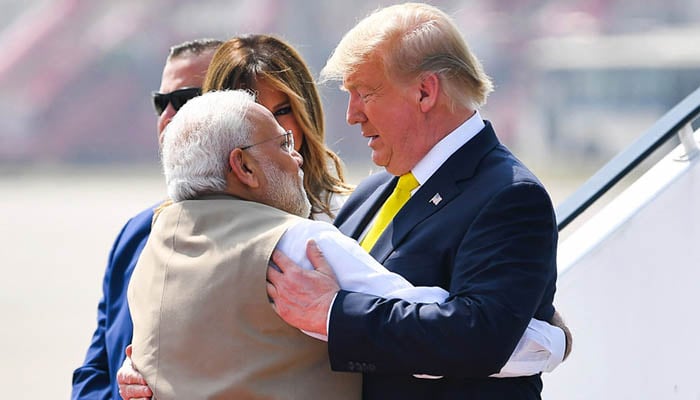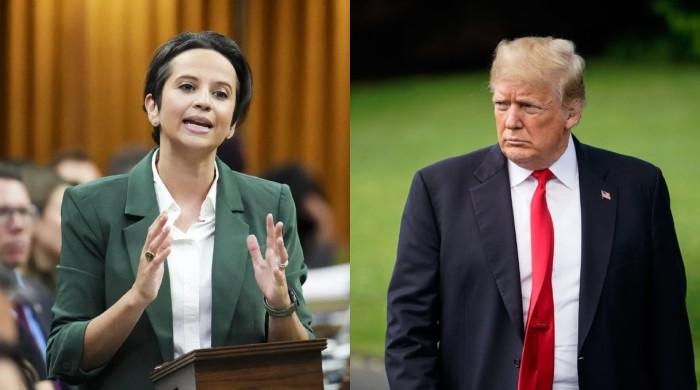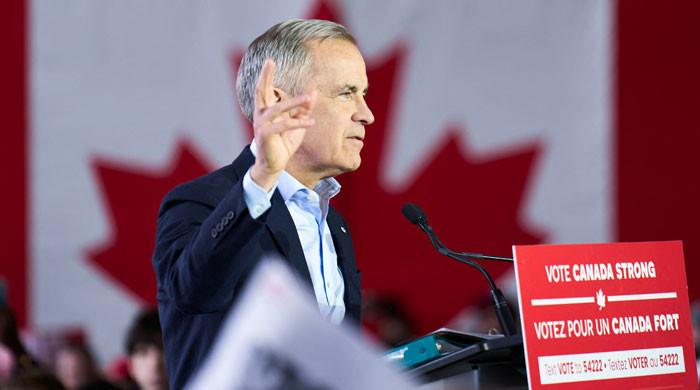Trump backs India on cross border terror & evades Kashmir & Muslim persecution
There was not a single word by President Trump on India’s unilateral annexation of Kashmir and denial of basic rights of 8 million Kashmiris under Indian occupation
February 24, 2020

US President Trump in his address today in Ahmedabad India reiterated future direction of global politics in which India plays the role of its key ally in the Indo Pacific region. Heaps of praise were showered by Mr. Trump on the Indian democracy and its fair play and the role of world's two largest democracies in regional and global peace. However, there was not a single word by President Trump on India’s unilateral annexation of occupied Kashmir and denial of basic rights of 8 million Kashmiris under Indian occupation. And the same is true for India’s new citizenship laws that targets the Muslim minority.
In fact, President Trump upheld the Indian narrative of terrorist groups operating from the Pakistani border to support Kashmir resistance movement and attacking the Indian armed forces. This is exactly the narrative India has been selling to members of the FATF. Supporting India's right to secure and control its borders, President Trump said, “My administration is working in a very positive way with Pakistan to crack down on terrorist organizations and militants operating on the Pakistan border” . President Trump further highlighting India's role added, “ India has an important leadership role to play in shaping a better future and greater responsibility in solving problems in this region”.
Prime Minister Modi and President Trump address today proved their detractors right. Avinash Kumar, Executive Director, Amnesty International India said today, “The internet and political lockdown in Kashmir has lasted for months and the enactment of CAA and the crackdown on protests has shown a leadership that is lacking empathy and a willingness to engage. We call on President Trump and Prime Minister Modi to work with the international community and address our concerns in their bilateral conversations. The Kashmir issue was addressed in an indirect way by President Trump but only to blame Pakistan based militancy for it.
India and USA are the world's largest and oldest democracies. The US foreign policy under the Trump administration is increasingly moving towards a “self-designed” solution to important long-standing conflicts. In its Deal of the Century document to resolve Palestine Israel conflict, the State Department mentions that the United Nations cannot solve this problem and brushed aside 100 UN Resolutions on this conflict. United Nations , European Union, OIC, China, all have rejected the Deal of the Century. Even Pope Francis yesterday warned against "inequitable solutions" to the Israeli-Palestinian conflict, saying they would only be a prelude to new crises in an apparent reference to President Trump's Middle East peace proposal.
United Nations Secretary General only last week in Pakistan again called to resolve the Kashmir issue in accordance with the UN Resolutions and the wishes of the Kashmiri people. However, President Trump after travelling 8000 miles into a conflict zone, opted to side with the Indian narrative on the Kashmir conflict. His reference to cross-border terror without addressing the core of the problem alluded that Kashmir is not peaceful and its people are deprived of basic human rights because of militancy emanating from the Pakistani border. President Trump did not refer to the Kashmir conflict, the misery of 8 million Kashmiris since Aug 5th, the brutal presence of nearly one million Indian forces to break the will of Kashmiris' right of self-determination.
As the leader of world oldest democracy and a champion of rule of law, the South Asian and global political observers wanted to know his point of view on the resolution of Kashmir conflict, on the controversial new Indian citizenship laws and other issues confronting the region. Only last week, the US Commission for International Religious Freedom issued a factsheet questioning Indian new citizenship laws laced with anti-Muslim bias and expressed severe apprehensions of India sliding into a Hindutva state. Margaret Huang, Amnesty International USA’s executive director said earlier today, “Anti-Muslim sentiment permeates the policies of both U.S. and Indian leaders. For decades, the U.S.-India relationship was anchored by claims of shared values of human rights and human dignity. Now, those shared values are discrimination, bigotry, and hostility towards refugees and asylum seekers,” However President Trump in his address today opted to talk more of the greatest ever trade deal with India and the new defense deals. The trade deal with USA is worth billions of dollars and India has already set its eyes on it after walking away from a ten-country Asia wide Free trade agreement led by China. The defense deals to be signed during President Trump's visit are around USD 5 billion including purchase of an air defense system for major Indian cities, Naval helicopters and other American military equipment.
The content of today’s address by both leaders met individual and collective objectives. Mr Modi will convince his voters to retain faith in him just like President Trump has and to overcome fallout of Kashmir, citizenship laws and faltering economy. President Trump will take back progress on trade deals, new defense orders and consolidating the Indo Defense Doctrine of US Defense department to contain Chinese influence in which India is stated to have a key role.











